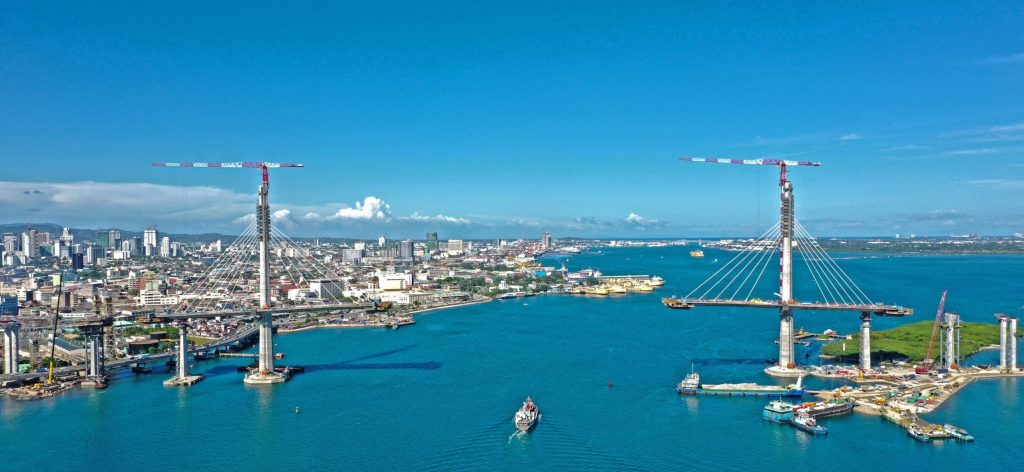Timed with the epic celebration of 500 years of Christianity in the Philippines, eight 40-meter-high crosses are rising 100 meters over the Mactan Channel and most of Cebu City in April this year.
The observance harks back to that memorable event when Christianity was first introduced to Cebu by the planting of a cross and the baptism of its people by Spaniards led by Portuguese explorer Ferdinand Magellan. It happened a few weeks after they arrived in the Philippines in March 1521.
The Metro Pacific Tollways Corporation (MPTC) through its subsidiary Cebu Cordova Link Expressway Corporation (CCLEC), builder of the 8.5-kilometer Cebu-Cordova Link Expressway (CCLEX), has already began building eight structures in the shape of a cross, inspired by the 500-year-old Magellan’s Cross and symbolizes Cebu being the cradle of Christianity in the region.

The installation of eight crosses on top of the CCLEX pylons will be completed and illuminated by hundreds of LED strip lights before the historic commemoration.
CCLEX will be part of the quincentennial commemorative celebrations in April 2021, with its eight 40-meter high crosses on all four sides of each of the twin towers. These will be lit at night, dramatically proclaiming once again Christianity’s influence in the Asia’s first Christian nation.
In the evening of April 15, 2021, Cebu Archbishop Jose Palma will lead the blessing of the CCLEX’s crosses as part of the Archdiocese of Cebu’s 500 Year of Christianity celebration. This comes a day after the reenactment of the first baptism mass at the Magellan’s Cross.
“The crosses above CCLEX is a symbol of celebration. The crosses, having no corpus or body, is ecumenical (universal, all-embracing),”
– Fr. Mhar Balili, secretary general of the Archdiocese of Cebu’s 500 Year of Christianity celebration
“With the cross-shaped structures lit up above the twin pylon of CCLEX, we are honored to become part of the commemorations of a historical chapter in the lives of our countrymen,”
– MPTC President Rodrigo E. Franco

CCLEC President and General Manager Allan G. Alfon said “Despite the constructional challenges because of the health and safety protocols being observed due to Covid-19, our team is doing their best to complete this most anticipated infrastructure project in Cebu and the rest of the Visayas region as soon as possible.”
“From the beginning, we have always known the socio-economic impact of CCLEX to the entire Visayan region,”
– MPTC Chairman Manuel “Manny” V. Pangilinan
The CCLEX, being built at a project cost of P30 billion, spans the Mactan Channel, linking mainland Cebu from Cebu City with the town across the famed channel, notably Cordova in Mactan island.
As of January 2021, the overall Engineering, Procurement and Construction (EPC) contract of CCLEX is at 68.21 percent while construction progress alone is at 59.68 percent.
The project’s concrete pylons on the side of Cebu City and Cordova have been completed and reached their full structural height of 145 meters over Mactan Channel. With continuing dismantling of the self-climbing formworks, the crosses on top of the pylons are now visible.
CCLEX is being implemented by CCLEC under a joint venture agreement with the local governments of Cebu City and Municipality of Cordova.

Set to be a new landmark in the country, CCLEX will have two lanes in each direction that will provide a safe, quick and scenic passage to an estimated 50,000 vehicles daily, easing the traffic in the existing Marcelo Fernan Bridge and the Mandaue-Mactan Bridge.
CCLEX has a design speed of 80 kilometers per hour (kph) and a navigational clearance or height of 51 meters to allow large vessels to pass underneath the bridge.
CCLEC is a subsidiary company of MPTC, the toll road arm of Metro Pacific Investments Corporation (MPIC), which is a publicly listed infrastructure holding company, and a member of the MVP Group of Companies.
MPTC is the largest toll road concessionaire and operator in the Philippines, whose expansion goals include establishing toll operations in the Visayas, other parts of the Philippines, and in neighboring countries notably Vietnam and Indonesia.
